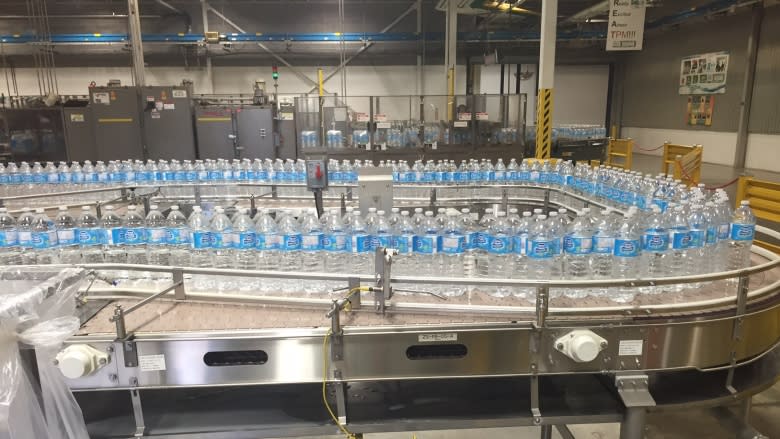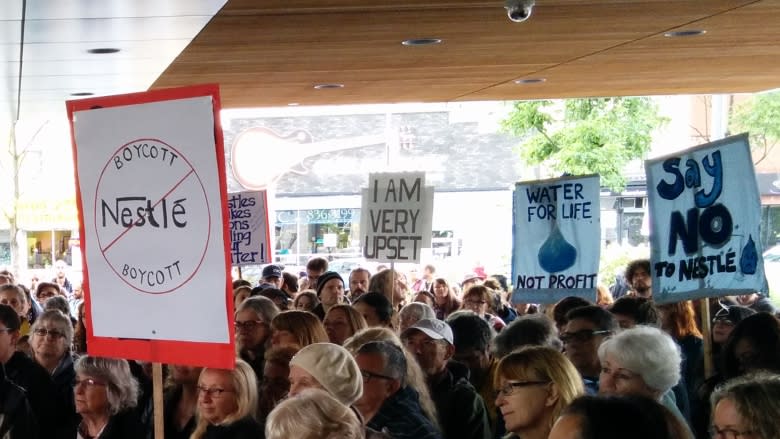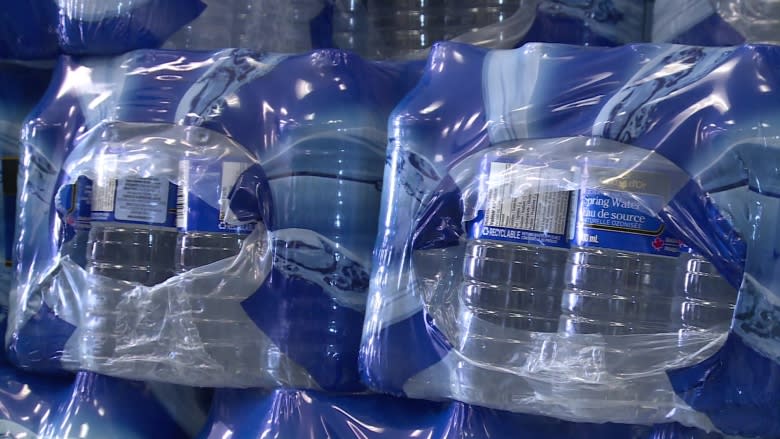Nestlé 'fully supports' proposed changes to Ontario's water taking pricing
Nestlé Waters Canada says it "fully supports" changes the provincial government wants to make to its water taking permits, including raising the price by $500 for every one million litres drawn.
"We will accept the final water price set through this process. In principle, we believe all groundwater users should be treated equally, but we understand and appreciate that opinions differ regarding the rates various water users should pay," read a company statement, sent to CBC News from Nestlé Waters' director of corporate affairs Jennifer Kerr.
The province announced Wednesday it is proposing a new fee for water bottling companies that take groundwater.
Currently, companies are charged $3.71 for every one million litres they take – a price that has outraged water advocates.
The province is now recommending that price jump to $503.71.
"Nestlé Waters Canada agrees that water sustainability is non-negotiable and all investments in groundwater research are a positive step toward our shared prosperity and a sustainable future. We are also encouraged by the direction the government is taking to support scientific research processes and policies to protect groundwater resources," the statement from Nestlé said.
But some argue it's not enough.
Mark Calzavara, the Ontario organizer for the Council of Canadians, said raising the price won't protect "vulnerable aquifers."
"The government must stop allowing companies to take groundwater for single-use bottled water sales," Calzavara said in a release. "Bottled water is a frivolous and wasteful use of a precious resource. Charging higher fees won't replace the water that is removed from the aquifer and shipped out of the watershed."
Province can't profit from water
But Mike Nagy, chairman of Wellington Water Watchers, said the increase is "encouraging" and raising the rates too much would create a new problem.
"It's a tough discussion, the pricing of these permits and these levy fees ... The province can't be seen to be profiting from water. So this $500 additional fee sends a loud and clear message to the industry that things are changing, they have changed and they're going to continue to change," Nagy said in an interview.
"This is recognizing these permits do cost a lot more money to monitor, to manage, to apply for – the application process – and the province is basically saying we need to start recouping some of those costs."
Need to reduce waste
Nagy said raising the price for permits is just one piece of the puzzle. His group also has serious concerns about the amount of solid waste from water bottles – something he hopes will be addressed under the Waste Free Ontario Act, passed last June.
"We wholly support and have always supported and want to go back to a reuse and deposit and return system for beverage containers. It's gotta happen," Nagy said.
He also encouraged water bottling companies to start thinking of an exit strategy.
"This, as we call it, is a sunset industry. It was never really meant to get as big as it was and it's wasteful and unnecessary," he said. "It's time to start a hard look at that and saying maybe we should be doing something better with our money."
Public input wanted
In announcing the proposed changes to water taking permits, the province noted the fee would be among the highest in Canada.
The government has also finalized a moratorium on new or expanded water takings by bottling companies until Jan. 1, 2019, and it is seeking the public's feedback on the province's guidance document for renewing water permits – which is open for comments until Jan. 31 – as well as a regulation establishing a new water bottling charge – which is open for comments until March 20.
Nestlé Waters said it will be "fully engaged" in the process.
The Council of Canadians said its supporters have made 3,464 submissions on the guidance document for renewing water permits.
Nagy encouraged residents to learn about the issue and speak out.
"We encourage people to keep the pressure on the province, because they are listening to the people and if the people don't continue letting them know this is a priority and they want to see change, the province will go on to other issues," Nagy said.
"But we believe the province is taking a lead and this can be something where Ontario can become a world leader in this area."




